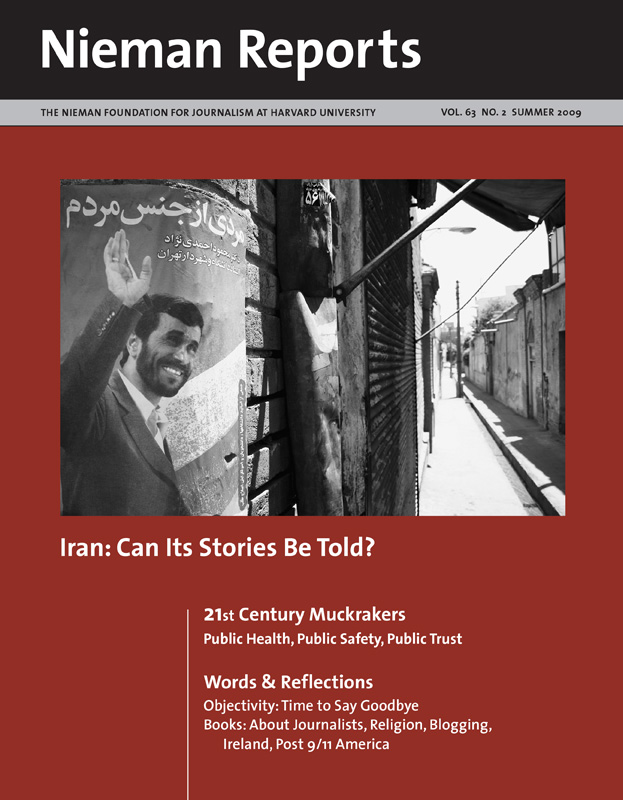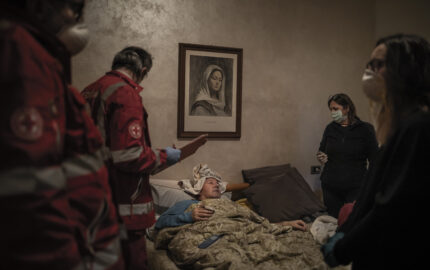
RELATED ARTICLE:
A year after his imprisonment, Bahari was interviewed about his experiences in Iran on NPR's Fresh Air.I’m not supposed to tell you this, but I met Mr. Mohammadi. In fact, I met three Mr. Mohammadis in four days. Mohammadi is the nickname of choice for the agents of Iran’s Ministry of Intelligence—the country’s equivalent of the CIA. They have other nicknames as well, most of which are variations on the names of Shi’ah imams such as Alavi, Hassani and Hosseini. I guess the names don’t indicate a rank or anything (I have to guess, because Mr. Mohammadi doesn’t tell you much. He asks the questions).
Mr. Mohammadi is responsible for the security of Iran. That includes protecting the values of its government. It’s a tough job. It’s like being in charge of Britney Spears’s public image. The values change so often that the officials who put former colleagues on trial today are careful not to be incarcerated by the same people tomorrow (who may well have jailed them in the past). Mr. Mohammadi’s job is to keep the integrity of the regime intact and to stop those who plan to undermine the holy system of the Islamic Republic.
But what does undermining mean? And what if it is the government that is doing the undermining (as it does constantly)? These questions seem to puzzle Mr. Mohammadi. So he is more than a little paranoid and edgy these days. When he calls you for questioning, you don’t know if he’s going to charge you with something or seek your advice.
These days, Mr. Mohammadi’s main concern is that the American fifth column, disguised as civil rights activists, scholars and journalists, is destabilizing the Islamic Republic. The U.S. government has, after all, allocated $75 million to promote “democracy” in Iran. It is also giving $63 billion in military aid to Saudi Arabia, Egypt and Israel to “counter Iran.” The United States would love to have agents in the country to take the money and spend it wisely. There are so many social and economic problems in Iran, that if someone wanted to exploit them to create dissent it wouldn’t be difficult to do so. But most activists I know inside Iran wouldn’t touch the money with a bargepole and resent the American government much more than their own. In the meantime, the Iranian government tries to find foreign perpetrators and domestic accomplices instead of solving the root causes of dissent, such as mismanagement of the country’s economy, poverty, internal migration, and drug addiction.
Hotels, Beverages and Conversation
In the 1980’s and 1990’s, intelligence agents were rough and scary, but nowadays they politely call you for tea at some fancy hotel or other to question you. I never understood their fascination with hotels. Why can’t you just meet them in their offices? Or why don’t they come to your office? Anyway, when you enter the hotel room you are offered a range of nonalcoholic drinks. Mr. Mohammadi is very generous with his beverages. As soon as you finish your tea you are offered Nescafé, then some kind of juice, then Fanta, Pepsi, etc. But he never offers anything solid. Why can you drink tea while being asked about plots against the government but not have a biscuit? Does an interrogation over a kebab lunch make it less trustworthy?
These questions pop into your head while you’re enjoying the comfort of not being in Mr. Mohammadi’s presence. He has killed many people in the past. And you know that he is capable of violence again if he thinks it necessary. Mr. Mohammadi’s counterparts in the numerous parallel security apparatuses (intelligence units of the judiciary, Revolutionary Guard, and the police) still have not caught up with his methods. Recently a number of students and labor activists were arrested, and instead of being offered tea or Nescafé they spent days in solitary confinement and were beaten with electric cables and batons. But Mr. Mohammadi’s Ministry of Intelligence is supposed to be the main agency. It is certainly the most professional and polite.
I met the three different Mr. Mohammadis while on assignment for Newsweek magazine. I was writing an article about the suppression of civil society and civil rights activists in Iran.
Day One: I’ve set up an appointment with a teachers’ union leader at a café. I am supposed to meet him after an exam at the high school where he teaches. The teacher doesn’t show up on time. I wait for an hour. Even by Iranian standards he is late. I call him on his mobile but it is off. Strange. He was so keen to talk the day before, so what has happened? I then get a call from his mobile.
“Who is that?” the caller asks. It is not the teacher.
“I’m Bahari from Newsweek.”
“News what?”
“Week.”
“So you’re a journalist. Will call later.”
I learn that the teacher was arrested during the exam and sent to prison. An hour later I get a call from a “private number.” It is a new voice. He is much more pleasant. “Could you come to the … Hotel at three this afternoon?” asks Mr. Mohammadi. It’s been a while since I’ve been summoned. Naturally I oblige.
Mr. Mohammadi has become more polite, cordial and strangely reassuring. He sneaks a smile when I ask him, “Why am I summoned here?” He used to give me an angry look that would mean he was the one in charge. He begins by asking simple questions about me and my work: Who am I? How long have I worked for Newsweek? Why did I want to meet the teacher? Have I ever met him before? What is the angle of my story?
Easy questions to answer. Mr. Mohammadi is quite relaxed. He scribbles in his notebook while I talk and every now and then exchanges a smile with me. There’s nothing remotely amusing about what I’m saying, but Mr. Mohammadi keeps smiling. That makes me think: What is so interesting about the banality I’m spewing here? Is he really taking notes, or is he doodling a fish? Is it a dead fish? When is he going to let me out of here? Is he going to let me out of here?
I get tired of talking after a while. Then, like Muhammad Ali in the seventh round of his fight with George Foreman, Mr. Mohammadi snaps and starts to challenge me. He keeps on smiling. I wish he wouldn’t. Why do I think an American publication is interested in talking to Iranian dissidents? Was I given a list of questions by American paymasters to ask the dissidents? Have I ever been to any conferences in the United States or Europe? Have I ever met any dissidents in Europe or the United States? How did I come to be chosen as Newsweek’s correspondent in Iran and not someone else?
Mr. Mohammadi is now targeting my integrity as a journalist, explicitly trying to make a connection between me and a dissident, suggesting that we both work as agents of the Great Satan and that we are part of a bigger plot to topple the Islamic government.
Halfhearted Interrogation
If this session had been with previous Mr. Mohammadis a few years ago, I would be scared of a pending trial and imprisonment for something I had never done—a destiny that befell many of my friends and colleagues. But what makes this Mr. Mohammadi tolerable is his halfhearted approach to the whole thing. His expression is not a grin or a smirk. He almost feels sorry for himself and asks for your sympathy. He looks genuinely confused and somehow out of his depth.
His bosses have come up with a conspiracy theory and asked Mr. Mohammadi to validate it. He is a smart man and has been down this road many times since the 1979 Islamic Revolution. It’s never worked in the past, and he really doesn’t think it will work now. Mr. Mohammadi knows that he’s wasting his time and mine. He knows that his government should reform itself if it wants to survive. As the former minister of intelligence, Ali Yunesi (who was removed from office by the current president) put it the other day, “Transforming the opposition into our supporters should be the main security strategy of the government, but unfortunately these days we not only fail to do that, but change our supporters into the opposition.”
But a job is a job. And Mr. Mohammadi has to pay rent and put food on his family’s table. He wraps up our session with a few farewell sentences that all other Mohammadis use: “I hope you don’t think it’s personal. There are people who want to take advantage of your good intentions. We just want to protect you.”
And then he delivers the punch line: “We know where you live.”
Day Two: I’m meeting a labor union activist. I’ve set up an appointment with him for 3 p.m. I’m supposed to see him after he’s found out the nature of the charges against him in an upcoming trial at the Revolutionary Court’s headquarters. The activist is late for our appointment. I try to contact him, with no success. I call a friend of his: The activist has been arrested.
When I get home, a friend calls me from London and says that I’ve been accused of being an intelligence agent. Earlier this year, I made a film for the BBC about the MEK, an Iranian terrorist group that opposes the Islamic government. The film exposed the group’s cult-like aspects and its collaboration with Saddam Hussein and the Americans. In the film, we also showed how the Iranian Ministry of Intelligence deals with MEK prisoners relatively humanely—not torturing or killing them as they did in the 1980’s, but treating them as cult members rather than terrorists. This progressive approach is converting former MEK members into supporters of the government. As a result, the MEK now accuses me of being an agent of the mullahs. I should tell this story to Mr. Mohammadi if he calls me again.
Day Three: Another Mr. Mohammadi calls: “The … Hotel at 11 a.m.” Mr. Mohammadi likes my MEK story but wonders what the reasons were behind making the film. “When you make a film or write an article you do it because you think it’s an important story. I really don’t need ulterior motives for doing my job, sir.” He doesn’t look convinced.
“But …” and he goes on asking me the same questions as Day One’s Mr. Mohammadi. And he smiles the smile as I start answering him. I give the same answers: “There is nothing surreptitious about what I do, sir. I’m just a journalist doing my job. I just report what I see around me. If there’s poverty, I report that. If there are terrorists, I write about them. And now when you arrest all these people, wouldn’t it be strange if I didn’t talk about them? Don’t you find it bizarre that the MEK calls me an agent in your pay and you question me as if I’m a guerrilla fighter?”
Mr. Mohammadi says that he is sorry for the trouble. He then gives me a modified farewell spiel. The conclusion remains the same: “We know where you live.”
Day Four: I’ve been meeting feminist activists to find out why 15 of them were sent to jail and how they were treated in Tehran’s Evin Prison. Apparently their Mr. Mohammadi was not that different from mine. He smiled and tried to find a connection between them and the U.S. government. Less than an hour after I leave the house of my last interviewee, I am invited to tea at a hotel. This time it’s different, more upscale. Finally, Mr. Mohammadi’s smile is gone. “There is one thing that you forget in your mature government theory.” I feel that he is finally coming out of his bureaucratic shell. “I’ve heard that you’ve studied in Canada.”
“Yes.”
“Good. Now imagine if Iran has 250,000 soldiers in Canada and Mexico (roughly the number of U.S. soldiers in Iraq and Afghanistan) and then allocates a budget to help civil rights movements in the U.S., let’s say to the Black Panthers or a Native American movement, wouldn’t Americans be paranoid? We know our problems much better than anyone, and we do our best to tell those who are responsible about the social maladies you just talked about. But this is Iran. It takes ages for anything to happen. In the meantime we have a vicious enemy to deal with: the U.S. It’s determined to topple our government by any means necessary. As Tom Clancy says, the U.S. is: ‘A Clear and Present Danger.’”
The Islamic Regime Change
I don’t know how Mr. Mohammadi will react to my writing about these encounters. Not too happily, I guess. He strongly advised me not to talk about them with anyone. But it’s important to know that Mr. Mohammadi has changed. And if he can change, the Islamic regime can change.
I’m still not convinced by his point about the American threat. Throughout its history, the Islamic Republic has looked for foreign enemies and has usually found them in abundance. Yet on many occasions it has undermined its own legitimacy by linking genuine domestic opposition to its foreign enemies. It’s time for the international community, especially the United States, to accept that the Islamic Republic is a force to be reckoned with and deserves as much respect as any other sovereign nation. But it is equally important for the Islamic Republic to realize its own maturity and act responsibly.
Maybe instead of a conference on the myth of the Holocaust, our president could organize a conference entitled “Islamic Republic of Iran: 28 Years of Trials and Tribulations.”
On a more personal note, the change can start with the government treating its citizens with respect. I know Mr. Mohammadi knows where I live. He doesn’t have to brag about it.


